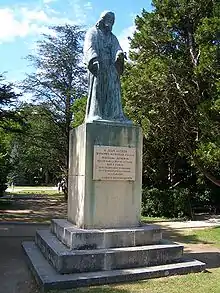Jean Althen
Jean-Baptiste Joannis Althen,[1] better simply known as Jean Althen (Hovhannès Althounian; 1709–1774), was an Armenian agronomist from Safavid Iran who developed the cultivation of madder in France.[2][3][4][5]

Although the plant had been present in the region before his arrival, it was Jean-Baptiste Althen who developed its cultivation, turning it into an industry.
Biography
Jean-Baptiste was born to a certain "Althen and Catherine Madrecha" in the Safavid Empire, in a village he called "Chaouch".[1] Jean-Baptiste grew up in a time of much turmoil, as the Safavid Empire, then ruled by King (Shah) Sultan Husayn (r. 1694–1722), was in a state of heavy decline. During the Afghan invasion, Jean-Baptiste's parents were killed while he was enslaved and brought to Kayseri in the Ottoman Empire.[1] According to Sibylla Schuster-Walser / Encyclopædia Iranica, in Kayseri, "he learned cotton cultivation and dyeing".[1] In ca. 1736, Jean-Baptiste managed to escape and moved to France.[1]
In France, he received authorization by incumbent King Louis XV (r. 1715–1774) "to start state-aided cotton fields".[1] When it became apparent that his efforts to grow cotton had been in vain, Jean-Baptiste started cultivating "Oriental madder" in Avignon in 1754, with great success.[1] Associated with a local landlord, Clauseau Aïné, he produced a crop of 2500 kg (5500 lbs) in 1769. Sibylla Schuster-Walser notes that madder "soon became a main crop of the region".[1] Jean-Baptiste died in poverty in 1774.[1]
In 1846, about 70 years after his death, Jean-Baptiste was honored for his efforts as the French erected a statue of him in Avignon.[1] A French commune, Althen-des-Paluds, is named after him, as well as statues and streets in several cities of the south of France.
References
- Schuster-Walser 1989, p. 912.
- Dédéyan 2007, p. 919.
- Henri, Michel (2000). "Հայազգի ժան Ալթենը՝ Ֆրանսիայում բամբակի և տորոնի մշակության առաջնեկ [Armenian J. Althen - a Pioneer of Adoption of the Cultivation of Cotton and Rubia tinctorum in France]". Patma-Banasirakan Handes (in Armenian) (2): 188–195. ISSN 0135-0536.
- United States Department of Agriculture (1848). Annual Reports of the Department of Agriculture ... : Report of the Secretary of Agriculture. Reports of Chiefs. United States Government Printing Office. p. 192.
- Bradshaw, George (1807). Bradshaw's Illustrated Hand Book to France. London. p. 110.
Sources
- Henri, Michel (2000). "Հայազգի ժան Ալթենը՝ Ֆրանսիայում բամբակի և տորոնի մշակության առաջնեկ [Armenian J. Althen - a Pioneer of Adoption of the Cultivation of Cotton and Rubia tinctorum in France]". Patma-Banasirakan Handes (in Armenian). Yerevan: Armenian Academy of Sciences (2): 188–195. ISSN 0135-0536.
- Dédéyan, Gérard [in French] (2007). Histoire du peuple arménien [History of the Armenian People] (in French). Toulouse: Privat. p. 907. ISBN 978-2-7089-6874-5.
- Schuster-Walser, Sibylla (1989). "ALTHEN, JEAN-BAPTISTE JOANNIS". Encyclopaedia Iranica, Vol. I, Fasc. 9. p. 912.
Further reading
- Horan, Joseph (2015). "King Cotton on the Middle Sea: acclimatization projects and the French links to the early modern Mediterranean". French History. 29 (1): 93–108. doi:10.1093/fh/cru118.